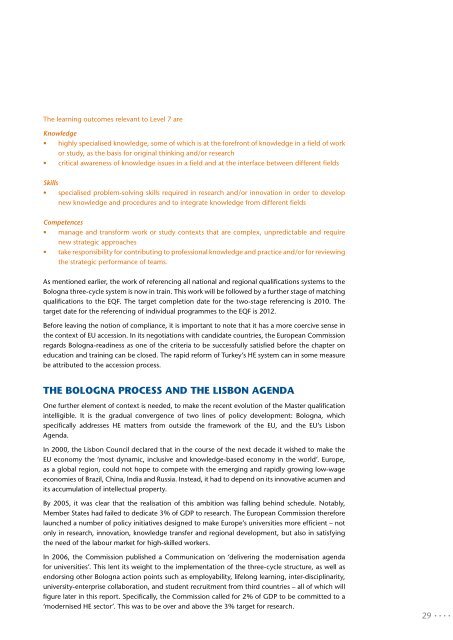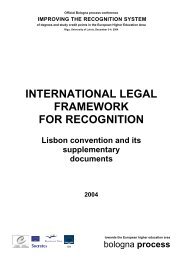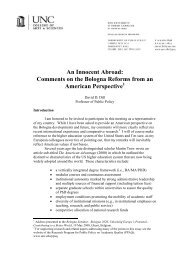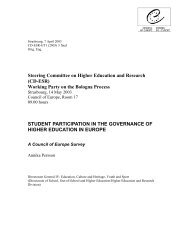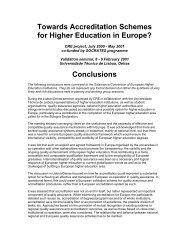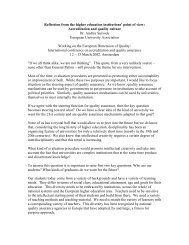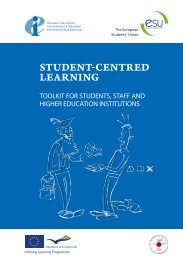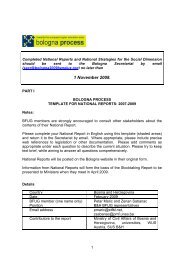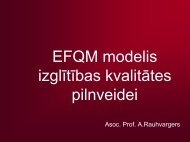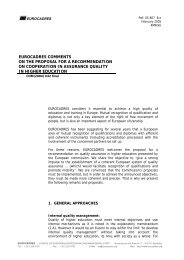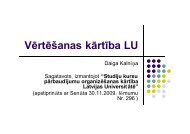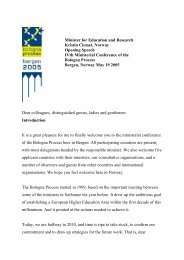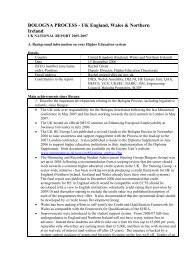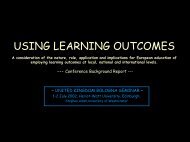EUA Survey Of Master Degrees In Europe - European University ...
EUA Survey Of Master Degrees In Europe - European University ...
EUA Survey Of Master Degrees In Europe - European University ...
Create successful ePaper yourself
Turn your PDF publications into a flip-book with our unique Google optimized e-Paper software.
The learning outcomes relevant to Level 7 areKnowledge• highly specialised knowledge, some of which is at the forefront of knowledge in a field of workor study, as the basis for original thinking and/or research• critical awareness of knowledge issues in a field and at the interface between different fieldsSkills• specialised problem-solving skills required in research and/or innovation in order to developnew knowledge and procedures and to integrate knowledge from different fieldsCompetences• manage and transform work or study contexts that are complex, unpredictable and requirenew strategic approaches• take responsibility for contributing to professional knowledge and practice and/or for reviewingthe strategic performance of teams.As mentioned earlier, the work of referencing all national and regional qualifications systems to theBologna three-cycle system is now in train. This work will be followed by a further stage of matchingqualifications to the EQF. The target completion date for the two-stage referencing is 2010. Thetarget date for the referencing of individual programmes to the EQF is 2012.Before leaving the notion of compliance, it is important to note that it has a more coercive sense inthe context of EU accession. <strong>In</strong> its negotiations with candidate countries, the <strong>Europe</strong>an Commissionregards Bologna-readiness as one of the criteria to be successfully satisfied before the chapter oneducation and training can be closed. The rapid reform of Turkey’s HE system can in some measurebe attributed to the accession process.The Bologna Process and the Lisbon AgendaOne further element of context is needed, to make the recent evolution of the <strong>Master</strong> qualificationintelligible. It is the gradual convergence of two lines of policy development: Bologna, whichspecifically addresses HE matters from outside the framework of the EU, and the EU’s LisbonAgenda.<strong>In</strong> 2000, the Lisbon Council declared that in the course of the next decade it wished to make theEU economy the ‘most dynamic, inclusive and knowledge-based economy in the world’. <strong>Europe</strong>,as a global region, could not hope to compete with the emerging and rapidly growing low-wageeconomies of Brazil, China, <strong>In</strong>dia and Russia. <strong>In</strong>stead, it had to depend on its innovative acumen andits accumulation of intellectual property.By 2005, it was clear that the realisation of this ambition was falling behind schedule. Notably,Member States had failed to dedicate 3% of GDP to research. The <strong>Europe</strong>an Commission thereforelaunched a number of policy initiatives designed to make <strong>Europe</strong>’s universities more efficient – notonly in research, innovation, knowledge transfer and regional development, but also in satisfyingthe need of the labour market for high-skilled workers.<strong>In</strong> 2006, the Commission published a Communication on ‘delivering the modernisation agendafor universities’. This lent its weight to the implementation of the three-cycle structure, as well asendorsing other Bologna action points such as employability, lifelong learning, inter-disciplinarity,university-enterprise collaboration, and student recruitment from third countries – all of which willfigure later in this report. Specifically, the Commission called for 2% of GDP to be committed to a‘modernised HE sector’. This was to be over and above the 3% target for research.29


